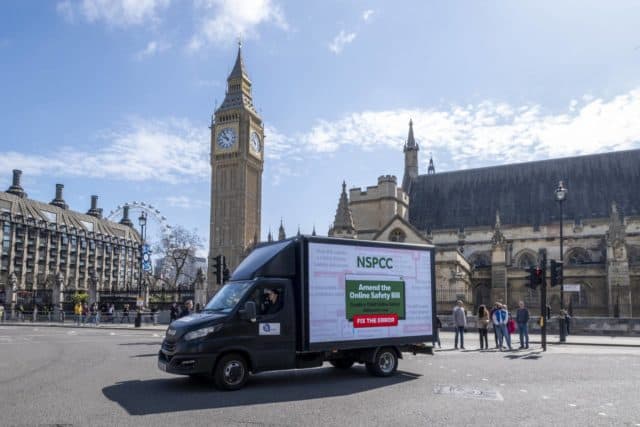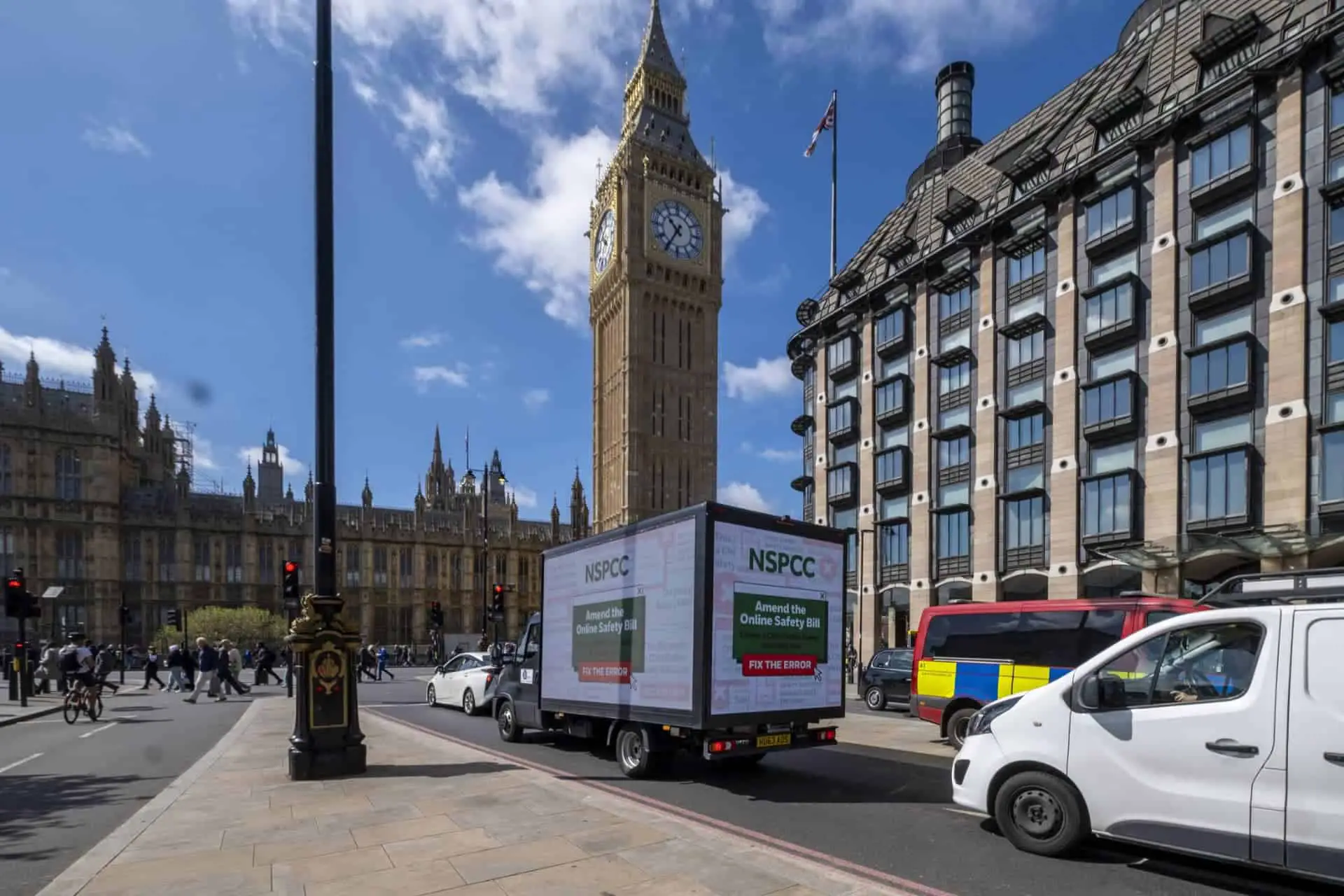Members of the public surveyed in the South of England overwhelmingly backed calls to strengthen the Online Safety Bill with an independent advocacy body to promote and protect children’s interests and safety.
YouGov polling of UK adults commissioned by the NSPCC shows 84% of the 541 who live in the South want an independent advocacy body to be created with an amendment to the Online Safety Bill due to be debated by Lords next week.
Helping to ensure children’s voices are heard
The amendment, tabled by former Victim’s Commissioner; Conservative peer Baroness Helen Newlove, would help ensure children’s voices are heard by the regulator Ofcom and provide a counterbalance to the powerful lobbying of large tech companies.
It is backed by Labour’s Lord Jim Knight, online child safety campaigner Baroness Beeban Kidron and Baroness Claire Tyler for the Liberal Democrats.
Barnardo’s, Young Minds, 5Rights and the Molly Rose Foundation and Breck Foundation, founded by bereaved parents Ian Russell and Lorin LaFave, have also strongly urged Government to adopt the amendment.
Messages delivered to Government
The survey comes as messages from more than 1,000 campaigners, parents, young people and survivors of online abuse were delivered to the Government, urging them to create a child online safety advocate to counteract the influencing power of big tech companies.
It shows consistent support for extra measures in the Online Safety Bill to better protect children by voters of all main parties and people of all ages, genders and backgrounds across the UK.

The polling revealed:
- 84% of 541 polled in the South want an independent advocacy body to be set up that acts specifically to promote and protect children’s interests and safety online
- 85% of 541 polled in the South say the Online Safety Bill should create the advocacy body to ensure technology companies and regulators fully understand the risks children face on social media
- 87% of 541 polled in the South think it’s necessary that new social media regulator Ofcom listens to the opinions and experiences of children
The Online Safety Bill
The Online Safety Bill is currently being debated by Lords and the NSPCC has called for it to be strengthened with a child online safety advocate to underpin the Government’s commitment to prioritise child safety in the regulation.
The move would mirror statutory user advocacy arrangements that are effective across other regulated sectors, including energy and transport.
Bill needs to go further
The NSPCC said it backed the vital measures in the Online Safety Bill but that, as it stands the new legislation does not have the mechanisms to ensure the experiences of children in the online world will be heard sufficiently quickly or powerfully by decision makers.
They want a child online safety advocate which can promote, protect, and represent children’s interests, amplify their voices and plug the gap left by years of inaction by tech firms to give children basic protections on their sites.
They say this would help ensure that children’s voices are not drowned out by large tech companies by providing direct representation for their needs in the new regulatory regime.
The advocate would also spot emerging risks to children and ensure they are swiftly tackled by tech companies before they can lead to serious harm.
Wanless: Ofcom would benefit from expert support
NSPCC Chief Executive Sir Peter Wanless said,
“The Government’s Online Safety Bill will bring in much needed regulation, but it has been contested by an industry for which children’s safety is too often an afterthought.
“Ofcom will become regulator with child sexual abuse taking place at record levels online and children still being bombarded with suicide content and misogynistic hate driven by aggressive algorithms.
“Despite this some companies will be resistant to change their business models and Ofcom would benefit from expert support to help clean up decades-worth of harm that is the result of failed self-regulation in the tech sector.
“A statutory child online safety advocate will be crucial for successful regulation. It will give a powerful voice to the experiences of children and act as an early warning system that embeds a focus on prevention into decision making.”
Young People’s Board for Change
Members of the NSPCC’s Young People’s Board for Change added their voice to the call for a child online safety advocate to represent the views and experiences of children.
They were joined by over 1,000 NSPCC supporters who shared personal messages for Government Ministers in charge of the Online Safety Bill outlining why they think there should be an advocate that stands up for children.
Deep and meaningful public support
Written by survivors of online abuse and harm, parents, grandparents, frontline practitioners and concerned members of the public, the responses show that there is deep and meaningful public support for this amendment.
They emphasised that as the online world rapidly develops, children are at increased risk and need a body which can stand-up for them, putting their safety first. They argued that children are the experts in their own lives and often have the best understanding of how changes online impact their safety.
Moss: Someone needs to be legally representing children
The move is supported by Ruth Moss, whose daughter Sophie died by suicide after viewing harmful material on social media. Ruth is one of those who shared their experiences with the Ministers. Ruth Moss said,
“Someone needs to be legally representing children, to ensure that in future, they have a voice, and that harm is prevented.
“The internet is a fast-moving, ever-changing environment. Children and parents cannot be expected to keep up with the latest internet risks, as effectively as an expert children’s advocacy organisation could.
“A children’s advocacy organisation would be able to concentrate on the processes and safety design of tech platforms, identifying risky design features and problems before they happen.”
LaFave: Nothing more important than enabling children to navigate the Internet safely
Lorin LaFave set up the Breck Foundation after her son was murdered after being groomed online. Lorin said,
“As we can see by these results the public are in full support of ensuring children’s experiences and interactions online are safe, and free from harm and abuse.
“There is nothing more important than enabling children to navigate the internet safely and this can only be possible with the assurance from an advocacy body that the tech companies are providing platforms which are free from predatory and dangerous behaviour towards children.”
Burrows: A crucial piece of the jigsaw to protect children from preventable online harm
Molly Rose Russell was 14 when she died by self-harm while suffering the negative effects of online content. Spokesperson for the Molly Rose Foundation, Andy Burrows, said,
“The Molly Rose Foundation strongly supports this amendment as a crucial piece of the jigsaw to protect children from preventable online harm.
“If online safety regulation is to succeed, children need a strong, resourced and expert watchdog body that can protect their interests and that can hold tech companies to account and the regulator’s feet to the fire.
“NSPCC polling has revealed that 86% of people think it’s necessary that Ofcom listens to the opinions and experiences of children and 83% say the Online Safety Bill should create the advocacy body. Clearly the public also feels this is a necessary step to give our children a seat at the table.”
News shared by Kelly on behalf of NSPCC. Ed





